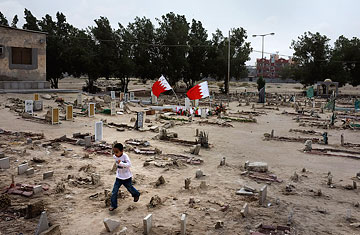
The fallen Flags mark the grave of 16-year-old Ali Yousif al-Satrawi, who was run over by a police car while taking part in a protest in the Manama suburb of Juffair last November
They called him the golden boy. Celebrated for his grace on the soccer pitch, Aala Hubail was, until last spring, Bahrain's best hope for a shot at the 2012 Olympics and a chance for the tiny island nation in the Persian Gulf to make the 2014 World Cup. Everyone in this soccer-mad country knew his name. But these days, the hero of Bahraini soccer lives alone in a sparsely furnished apartment in the Omani city of Soor, where he now plays for a local club. The bruises from repeated beatings in detention have faded, but he walks warily, as if still expecting a blow.
Many of his teammates are similarly dispersed and share the same horrific memories. The sudden exodus of Bahrain's best national players has been a boon for international club soccer but has proved devastating for a home team that probably won't see the world stage for at least another generation. "We were so close," says Hubail. "And then we lost it all."
Hubail's sudden reversal of fortune reflects that of Bahrain, a comfortably prosperous nation that, since a crackdown on pro-democracy demonstrations that started nearly a year ago, has seen its international standing plummet and its projected growth for 2011 slashed in half. The Formula 1 International Circuit pulled out in early 2011 over concerns about human-rights abuses, costing the country millions in licensing fees and anticipated tourism revenue. This cosmopolitan country, once applauded for peaceful coexistence between a Sunni monarchy and its majority Shi'ite population, has been transformed into a police state; its Shi'ite-dominated professional class has been hollowed out by suspicion and sham trials.
Tunisia, Egypt and Libya may still be suffering from their Arab Spring hangovers, but Bahrain offers a sobering lesson in how much worse it can be when revolutions fail. The largely Shi'ite revolutionaries in Bahrain, an island nation with limited access to weapons, are unlikely to resort to the armed uprisings of Libya or Syria. Instead, the country faces prolonged, low-intensity unrest that threatens to calcify a long-standing perception of discrimination into what many Shi'ites are starting to call an apartheid state, setting the stage for open sectarian conflict that could destabilize the region.
Linked to Saudi Arabia by a 25-km-long causeway, Bahrain is ethnically Arab. But an estimated 70% of the population shares the same Shi'ite faith of archenemy Iran. Saudi Arabia has no desire to see a pro-democracy uprising in its backyard, nor does it want a Shi'ite uprising strengthening Iran. Bahrain's economy, based on oil refining, banking and tourism, depends on Saudi patronage; the government is unlikely to defy the will of its larger neighbor.
Bahrain may be small — 500,000 citizens — but it is a potential flash point as tensions rise among Iran, the U.S. and Saudi Arabia. Bahrain is an essential American ally, providing a base for the U.S. Navy's Fifth Fleet, which protects the Persian Gulf, the Strait of Hormuz and some 50% of the world's oil production. One analyst likens Bahrain to Serbia in 1914: an inconsequential country until it ignited World War I.
None of these issues were of any concern to Hubail in the early days of the Arab Spring. Tens of thousands of Bahraini citizens gathered at the capital's Pearl Roundabout on Feb. 14 to demand long-promised political reforms, calling for the Prime Minister, Sheik Khalifa ibn Salman al-Khalifa — who had served for more than 40 years by appointment of his nephew the King — to stand down and make way for a directly elected parliament.
But Hubail's passivity changed when five demonstrators died in an early-morning raid by government security forces on the protest camp two days later. They then attacked the mourners with tear gas and live ammunition, launching an escalating cycle of protests, government retaliation, deaths and funeral processions that sparked even larger protests and has resulted in more than 50 dead.
What started as a solidarity movement from both sides of Bahrain's religious divide quickly devolved into a sectarian rift as the monarchy preyed on Sunni fears of being overwhelmed by the Shi'ite majority should the government implement representational democracy. "They say there can't be reform until the sectarian problem is resolved," says Matar Matar, a member of the Shi'ite-dominated Wefaq party, which resigned from parliament in protest over the crackdown. "But if we have more democracy in Bahrain, the problem will be eliminated." Instead, it was allowed to fester, and soon Hubail was sucked into the politics he had long eschewed.
